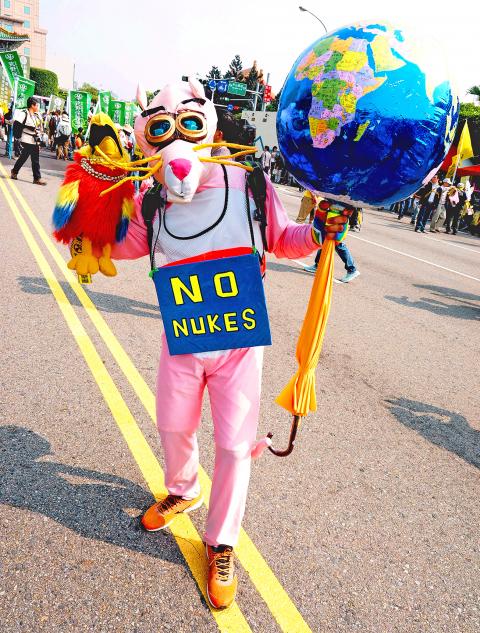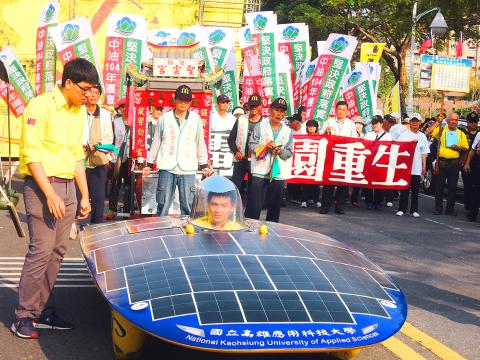Tens of thousands of people opposed to nuclear energy yesterday came together nationwide in antinuclear parades and rallies, joining an alliance of civic groups to raise awareness about perceived problems with the nation’s nuclear policies.
In Taipei, environmental activists and residents from New Taipei City’s Jinshan (金山) and Wanli (萬里) districts took the stage as crowds flocked to Ketagalan Boulevard.
Responding to this year’s theme — to “bid farewell” to nuclear energy — many held banners or props bearing elegiac messages, such as “Nuclear Energy RIP” and signs bearing the Chinese character tien (奠), a common item displayed at traditional Taiwanese funerals, to mourn the deceased.

Photo: EPA
Although the Fourth Nuclear Power Plant in New Taipei City’s Gongliao District (貢寮) has been shuttered since last year after construction was halted following a safety assessment, the plant’s maintenance fees amount to billions of New Taiwan dollars every year, and the government should therefore demolish the plant, Green Citizens’ Action Alliance secretary-general Tsuei Su-hsin (崔愫欣) said.
With the Jinshan and Guoshen nuclear plants in New Taipei City’s Shihmen (石門) and Wanli districts respectively approaching retirement age, problems retrieving spent fuel rods during maintenance and storage pools at the Jinshan plant nearing capacity, the government must not extend the service life of the facilities, Northern Coast Anti-Nuclear Action Alliance chairperson Hsu Fu-hsiung (許富雄) said.
Wu Wen-chang (吳文樟), a Gongliao resident, accused state-run Taiwan Power Co (Taipower, 台電) of plotting to start operations of the Fourth Nuclear Power Plant by browbeating Taiwanese with a power shortage.

Photo: Ke Yu-hao, Taipei Times
He said that by simultaneously carrying out maintenance at a large number of coal-fired power plants, including the Taichung Power Plant, Taipower plans to throttle the nation’s surplus electricity supply from more than 20 percent to about 3 percent, forcing the public to accept the opening of the Gongliao plant.
Tao Aborigine and Orchid Island (Lanyu, 蘭嶼) resident Syamen Womzas said the government has yet to honor a promise it made 12 years ago to relocate nuclear waste stored in his hometown.
“The government stored nuclear waste on Lanyu through deception. The residents never agreed to the plan. It is very unfair to us who do not use nuclear energy. We hope that the government relocates the waste soon,” Syamen Womzas said.
Piho Yuhaw, an Atayal Aborigine from Yilan’s Nanao Township (南澳), said government authorities are conducting geological assessments to set up a deep geological repository on the border of Yilan and Hualien counties, near his home.
He said the government targeted land reserved for Aboriginal people whenever the storage of nuclear waste comes up, calling it an act of bullying minorities and a violation of the Aboriginal Basic Act (原住民基本法), which stipulates that the government must not go against Aboriginal groups’ will to store harmful substances on their land.
He said that nuclear waste storage is an issue, but Taiwan must not overlook the larger picture, which is to abolish nuclear energy.
To demonstrate how alternative energy sources can be effectively utilized, Lee Yung-tsung (李永宗), a wind energy researcher based in Chiayi County, set up two stationary bicycles that collected kinetic energy from pedaling volunteers and stored it in a lead-acid battery that was used to power a coffee machine and cell phone charging ports.
“Hopefully, through this device, people will understand that electricity is difficult to come by, that even after exerting so much strength, the electricity generated can only power so few household applications,” Lee said.
In southern Taiwan, led by a religious procession, about 10,000 protesters marched through downtown Tainan, demanding a nuclear-free homeland.
A local antinuclear organization called for the government to recognize the public sentiment toward abolishing nuclear plants nationwide, adding that it is the citizens’ right and obligation to fight for a green homeland and the freedom from nuclear fear.
Protesters headed by educators and parents from nearby Yunlin County also joined the rally in Tainan, saying they are fighting for the well-being of their children.
Meanwhile, about 100 antinuclear protesters amassed at four major crossroads in downtown Taitung County, calling for the government to remove nuclear waste from the county.
Activists performed a skit in which they pretended to bury the four nuclear plants in Taiwan.
Antinuclear activist and aboriginal folk musician Nabu said that the county has the potential to develop renewable energy, and Taitung citizens are firm on their antinuclear stance.
In outlying island Penghu, an antinuclear rally was joined by several environmental groups and Penghu County Commissioner Chen Kuang-fu (陳光復).
Protesters on bikes gathered in front of Taipower’s office to stage a demonstration, saying that they want to put an end to nuclear power and demand an aggressive energy policy reform.
A series of antinuclear protests were sparked soon after the Ministry of Economic Affairs listed the county’s Wangan Township (望安) among its two preferred locations for storing low-radiation nuclear waste in 2009.

NATIONAL SECURITY THREAT: An official said that Guan Guan’s comments had gone beyond the threshold of free speech, as she advocated for the destruction of the ROC China-born media influencer Guan Guan’s (關關) residency permit has been revoked for repeatedly posting pro-China content that threatens national security, the National Immigration Agency said yesterday. Guan Guan has said many controversial things in her videos posted to Douyin (抖音), including “the red flag will soon be painted all over Taiwan” and “Taiwan is an inseparable part of China,” while expressing hope for expedited “reunification.” The agency received multiple reports alleging that Guan Guan had advocated for armed reunification last year. After investigating, the agency last month issued a notice requiring her to appear and account for her actions. Guan Guan appeared as required,

A strong cold air mass is expected to arrive tonight, bringing a change in weather and a drop in temperature, the Central Weather Administration (CWA) said. The coldest time would be early on Thursday morning, with temperatures in some areas dipping as low as 8°C, it said. Daytime highs yesterday were 22°C to 24°C in northern and eastern Taiwan, and about 25°C to 28°C in the central and southern regions, it said. However, nighttime lows would dip to about 15°C to 16°C in central and northern Taiwan as well as the northeast, and 17°C to 19°C elsewhere, it said. Tropical Storm Nokaen, currently

‘NATO-PLUS’: ‘Our strategic partners in the Indo-Pacific are facing increasing aggression by the Chinese Communist Party,’ US Representative Rob Wittman said The US House of Representatives on Monday released its version of the Consolidated Appropriations Act, which includes US$1.15 billion to support security cooperation with Taiwan. The omnibus act, covering US$1.2 trillion of spending, allocates US$1 billion for the Taiwan Security Cooperation Initiative, as well as US$150 million for the replacement of defense articles and reimbursement of defense services provided to Taiwan. The fund allocations were based on the US National Defense Authorization Act for fiscal 2026 that was passed by the US Congress last month and authorized up to US$1 billion to the US Defense Security Cooperation Agency in support of the

PAPERS, PLEASE: The gang exploited the high value of the passports, selling them at inflated prices to Chinese buyers, who would treat them as ‘invisibility cloaks’ The Yilan District Court has handed four members of a syndicate prison terms ranging from one year and two months to two years and two months for their involvement in a scheme to purchase Taiwanese passports and resell them abroad at a massive markup. A Chinese human smuggling syndicate purchased Taiwanese passports through local criminal networks, exploiting the passports’ visa-free travel privileges to turn a profit of more than 20 times the original price, the court said. Such criminal organizations enable people to impersonate Taiwanese when entering and exiting Taiwan and other countries, undermining social order and the credibility of the nation’s